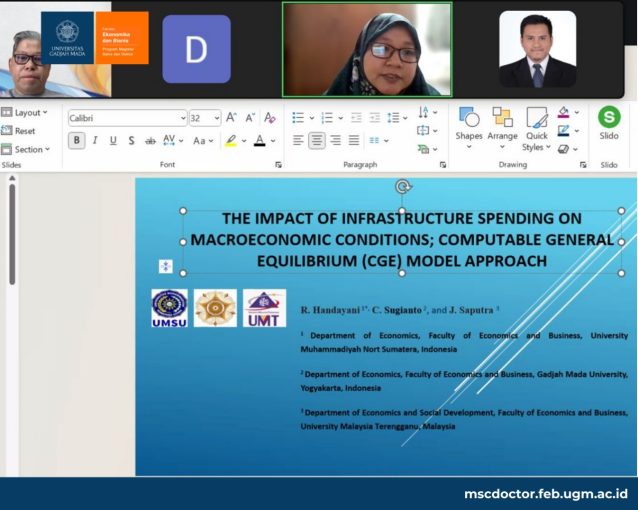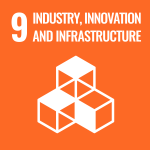
Dr. Rita Handayani, SEI, M.Si., a lecturer from Universitas Muhammadiyah Sumatera Utara currently undertaking a Postdoctoral Fellowship at the Faculty of Economics and Business, Universitas Gadjah Mada (FEB UGM), participated in the 2nd International Congress of Finance and Tax held at Selçuk University, Konya, Turkey. This prestigious event took place from November 8–10, 2024, bringing together academics and researchers from Algeria, Azerbaijan, Bosnia and Herzegovina, Georgia, India, Indonesia, Japan, Kosovo, Libya, Malaysia, Nigeria, North Macedonia, Pakistan, Portugal, Romania, Serbia, Türkiye, and Ukraine to discuss pressing issues in finance and taxation.
Dr. Rita presented a collaborative research study conducted with Prof. Catur Sugiyanto (Universitas Gadjah Mada) and Jumadil Putra, Ph.D. (University of Terengganu, Malaysia), titled “The Impact of Infrastructure Spending on Macroeconomic Conditions: A Computable General Equilibrium (CGE) Model Approach.” The study explores the critical role of infrastructure investment in driving economic recovery and fostering sustainable economic transformation. It focuses on infrastructure spending policies in the macroeconomic context of Indonesia, which faces significant challenges due to the COVID-19 pandemic and the global economic crisis.
The research underscores that equitable infrastructure development across all provinces in Indonesia represents social justice for all Indonesians. Employing a CGE model and utilizing infrastructure expenditure data from 2020–2023 analyzed through GAMS software, the study provides empirical evidence that infrastructure policies positively influence economic growth, increase labor absorption in economic sectors, and enhance household income.
The findings reveal that infrastructure investment not only supports short-term economic recovery but also ensures long-term stability. It helps reduce regional and income disparities while promoting equitable access to resources and opportunities across regions and socioeconomic groups. Indonesia requires resilient, inclusive infrastructure designed to enhance welfare and address future challenges through adaptability and technological integration for optimized solutions.
The conference aligns with Sustainable Development Goals (SDGs), particularly Goal 9 (Industry, Innovation, and Infrastructure), which emphasizes reducing economic disparities, improving global welfare, and driving infrastructure transformation. Sustainable infrastructure provides tremendous opportunities for positive change, especially as the world grapples with climate crises, a global economic slowdown, and the need to address inequality disproportionately affecting the most vulnerable populations.
Dr. Rita Handayani and her team’s participation in this conference reflects a tangible effort to bring Indonesia’s data-driven perspectives and solutions to the global stage. By focusing on inclusive and sustainable infrastructure development, their contribution demonstrates the significance of academic collaboration in addressing global challenges and fostering shared progress. Moving forward, Indonesia’s infrastructure development must evolve into being more resilient, inclusive, socially impactful, and aligned with transitioning to a resource-efficient and sustainable economy.

